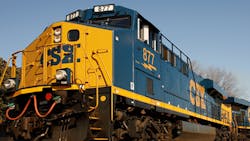CSX Corp. announced on Nov. 30 that it will acquire New England’s Pan Am Railways, Inc., whose rail carrier subsidiaries comprise North America’s largest regional railroad.
“In Pan Am, CSX gains a strong regional rail network in one of the most densely populated markets in the U.S., creating new efficiencies and market opportunities for customers as we continue to grow," said James M. Foote, CEO of CSX in a statement. "We intend to bring CSX’s customer-centric focus and industry-leading operating model to shippers and industries served by Pan Am."
Pan Am, which is headquartered in North Billerica, Mass., owns and operates a highly integrated, nearly 1,200-mile rail network and has a partial interest in the more than 600-mile Pan Am Southern system.Its network across New England has access to multiple ports and large-scale commodity producers.
The transaction will expand CSX’s reach in Connecticut, New York and Massachusetts while adding Vermont, New Hampshire and Maine to its existing 23-state network.
CSX made nearly $1.5 billion in infrastructure capital expenditures in its network in 2019, supporting economic growth and ensuring the safety and efficiency of the supply chain.
David A. Fink, president of Pan Am Railways, said: “Pan Am is pleased to reach this agreement with CSX, a North American leader in rail-based freight transportation," said. David A. Fink, president of Pan Am Railways in a statement."This is great news for New England shippers and the national freight network overall.”
Terms of the transaction were not disclosed. The transaction is subject to regulatory review and approval by the Surface Transportation Board.
